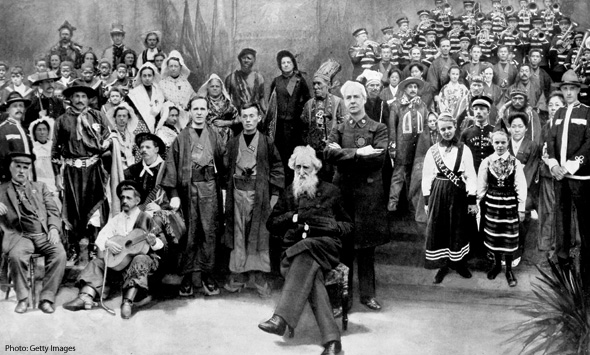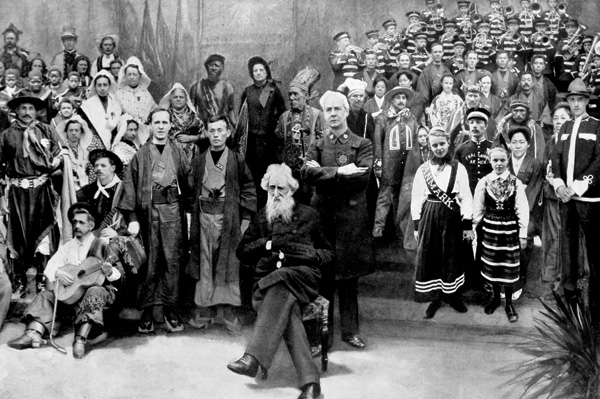
William Booth, founder of The Salvation Army, loved evangelistic campaigns. He viewed them as colourful, exciting and an effective way of getting things done. In fact, the Army—from its beginnings with General Booth—to the present with General Bond―has engaged in a continual campaign to win the world for Jesus. Even though Army language has changed from battles and conquest to worship and relationship, the Movement still proclaims that “we are an Army, mobilized by God.”
During the two decades following Booth's first open-air meetings in England in 1865, the Army's leaders busily directed a Movement that spread like wildfire throughout the British Isles. Drawing heavily on the orders and regulations of the British armed forces, Bramwell Booth and George Scott Railton formulated The Salvation Army's own Orders & Regulations, which provided a cohesive yet flexible structure that ensured the fledgling Army would survive and grow.
The evangelistic energy of early converts meant that wherever they went they became the Army, challenged by a vision that included the whole world. They took to heart John Wesley's phrase: “The world is my parish.” Early Army “war songs” (found in the current Salvation Army Song Book) reflect this imperialistic vision and reveal the motivation behind worldwide expansion: “Salvation Army, Army of God, onward to conquer the world with fire and blood”; “All the world to save, to battle we will go ... with a trumpet voice we'll let the millions know, there's salvation for the world.”
As for mission strategy, some thought it did not exist. When the Army “invaded” the U.S.A. in 1880, the press could not contain its surprise as Railton and seven young unmarried women disembarked. This was an Army? The same year two men, who had been saved through the Army in the U.K., met in Adelaide, Australia, and commenced Army meetings. A year later William and Catherine Booth sent their daughter, Catherine, to one of the worst slums in Paris, France, to “open fire” and establish the Army. In 1882, two young men in London, Ontario, met at a church service and discovered each had been a Salvationist in England. Before long they took to the open air to preach. The same year Frederick Booth-Tucker—a converted magistrate—and five companions planted the Army flag in India, much to the annoyance of the British ruling class.
The same tactics were repeated wherever the Army “opened fire”: go in faith, preach the love of Jesus, be prepared for anything. Is it any wonder that by 1914 four international congresses had been held, with thousands of Salvationists from every country where the Army was at work bringing unimagined pageantry to London?
From small beginnings in the east end of London 146 years ago, The Salvation Army has spread its ministry throughout the world in 124 countries. Recent additions include Togo, the Turks and Caicos Islands, United Arab Emirates and Solomon Islands. Active Christian concern has given the Army a visibility that far exceeds its numerical strength. And throughout the world there are unnamed, yet heroic, Salvationists who have answered the call to service, seeking nothing but the privilege of introducing people to the Saviour and thus healing the world's ills.
Lt-Colonel Max Ryan is retired in Burlington, Ont., where he serves as a part-time hospital chaplain and amateur Army historian.










Comment
On Thursday, December 15, 2011, Ron Reeves said:
On Monday, September 5, 2011, Don Jefcoat said:
It wasnt uncommon for a band of some sort along with the flag unfurloed and raised high to be marched in from the edge of the town to the center where an impromptu open air service was held. The war was declared quickly and sometimes before the meeting hall was located. I grew up in a corps that when one looked at the historical pictures that lined the walls we saw that corps building was blocked by the soldiers, adherants, and visitors. Today that once vibrant and on fire corps is nothing more then a museum. The drum I played as a child the pulplit that many a spirit led sermon, the mercy seat where many a sole gave or committed their lives to Jesus be pushed up into a corner. The piano sits silent that years ago rang out with great leading of worship "Hallejua" But no longer.
I have said over and over again will continue to say over and over Its not the old ways that killed the corps I grew up in, it was the leadership not caring. I honestly beleive that if the army were to through away all the modern policies of educational requirements, age requirements, and literally return to the day and age of booths army we would once again have an Army that was growing.
On Friday, September 2, 2011, Jacqueline M. Darby-Robinson, M.T.S. said:
On Tuesday, August 30, 2011, Rob Jeffery said:
I am encouraged that some of our growth today is still caused by soldiers, lay members, who desire to see the Army's work expand. The thought of new growth achieved and initiated by our laity, as well as by our officers, is exciting. May we learn a lesson from history and never forget that missional zeal can be lived out at both the top-down, and the grassroots level.
Leave a Comment